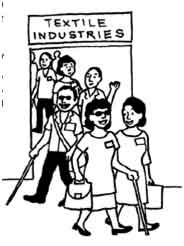Your progress
0%
Here are some of the key ideas you will need to understand in order to effectively support the development of self-employment opportunities for people with disabilities.
Use your mouse or keyboard to expand each of the headings below.
“Self-employment” means activities in both the formal and informal economies that are owned, operated and managed by an individual or a small group. There is a wide spectrum of types of self-employment, identified by the activity, complexity and number of people involved. The activities range from keeping a few chickens for sale at the local market to running a large workshop making articles for export.
Income-generating activities or programmes are small-scale activities that may be the sole source of income for an individual or group, or supplement another source of income, such as farming.
The activities may be full-time, part-time or seasonal and are usually based on traditional technologies, local materials and local markets. They are normally part of the informal economy.
It is important for CBR to find ways in which women with disabilities can initiate and run economically productive activities and earn income for themselves and their families.
Examples of income-generating production activities include animal and poultry raising, producing crafts and knitting garments
Examples of providing a service as an income-generating activity include renting out a mobile phone, washing cars, recharging batteries, and running a teashop.
Learn about the service provided by an Indian woman who lost her sight.


The Centre for Overall Development (COD), a development non-governmental organization in Kerala, South India, started CBR and set up a small factory making export-quality ceiling fans. The factory employs 40 people, half of whom have disabilities.
All components of the fans – including the electric motors — are produced from scratch using locally sourced raw materials. The fans are of high-quality and are exported through a company in Delhi to Arabian Gulf countries. The project is based in a village, but setting it up required extensive collaboration between the non-governmental organization, local government, banks and corporate business. The factory is managed by the workers themselves and is a demonstration of the success that can be achieved thorough market research, high but realistic ambitions, and effective networking.
Examples of income-generating trading activities include running a petty shop and selling second-hand goods.

Small and medium enterprises operate on a larger scale than income-generating activities.
They employ more than one person and constitute the principal source of income for those engaged in them. (The word “micro-enterprise” is sometimes used, but there is no difference between small and micro-enterprises.) These enterprises may involve an entire family or a group of families, and may have employees. Services and products range from simple to complex and are sometimes sold to markets beyond the immediate community. Such enterprises usually require good technical and management skills. They are often in the informal economy, but may occupy a borderline area between the formal and informal economies — for example, they may build parts in an informal, home-based system; but then sell the parts to large factories in the formal economy.
Examples of production activities that may be performed in small and medium enterprises include:
Learn how a fan-production factory was set up in Kerala, South India.


The Centre for Overall Development (COD), a development non-governmental organization in Kerala, South India, started CBR and set up a small factory making export-quality ceiling fans. The factory employs 40 people, half of whom have disabilities.
All components of the fans – including the electric motors — are produced from scratch using locally sourced raw materials. The fans are of high-quality and are exported through a company in Delhi to Arabian Gulf countries. The project is based in a village, but setting it up required extensive collaboration between the non-governmental organization, local government, banks and corporate business. The factory is managed by the workers themselves and is a demonstration of the success that can be achieved thorough market research, high but realistic ambitions, and effective networking.
Examples of providing a service at the level of small/medium enterprises include:
Self-employment in the informal economy often comes with no pension or other form of security. Self-employed people need to find ways to ensure some security in their lives; the best way to do this is through membership in a group. The formation of self-help groups has become in some countries the dominant tool for community development.
“Self-help group” is the generic term for a group of people who come together for a common purpose. In many cases, this is to save money through a group savings scheme. Savings may be used for helping individual group members to start or expand a business, or the group may run a business as a joint enterprise to share the risk and undertake an activity on a scale not possible for an individual. But the most important function of such a group is that it brings people together for a common purpose, strengthens social bonds and makes community development a reality.
People with disabilities may join non-disabled groups, or form groups of their own.
The word “cooperative” is often used for a group conducting a collective enterprise. Formal cooperatives are business associations run by their members and regulated by law. There are cooperatives whose membership is made up entirely of workers with disabilities, as well as cooperatives that have a mixed membership of disabled and non-disabled people. People with disabilities who wish to set up a cooperative need to become familiar with and follow all relevant laws, rules and regulations.
Learn about a cooperative of individuals with disabilities who are making school furniture in the Philippines.


Almost all 650 members of the 12 primary cooperatives belonging to a national federation of cooperatives in the Philippines are people with disabilities. They include workers with physical, sensory and intellectual impairments.
The federation is certified by the Cooperative Development Authority as the only secondary-level cooperative of people with disabilities in the Philippines. Its primary line of business is the production of school chairs and desks for the Ministry of Education. Their business motto is “We do not want you to buy our products out of pity. Buy our products because they are a better deal.”